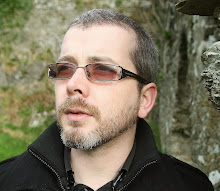Friday, 19 December 2014
Down Among The Dead by Steve Finbow
Down Among The Dead by Steve Finbow is a novella I didn't see coming. Published by #13 Press (and released on the 13th of December), it's the second in a proposed series of 13 novellas to be issued over 13 months. So, that's fun.
Finbow's writing style is slightly idiosyncratic. He doesn't present his dialogue in the conventional manner for a start. It's woven into his paragraphs like internal monologue; through the filter of a paranoid wreck. This creates a disjointed feel to the narrative which works well for the dual timeline that the subject, Michael O'Connor, relays to us in first person. O'Connor, a Belfast man in the twilight of his regret-filled life, may be an unreliable narrator, but his fears are very real. The scenes set in 2008 see him as a broken man with loose lips, a stark comparison to the O'Connor of 1998 who still half-believes his own Belfast bravado.
On the face of it, and because 1998 was quite a year for Northern Ireland and the peace process, I expected this slim tome to be heavy on the politics. And to be honest, I was relieved to find that this was more of a human story. An examination of regret and self-destruction. The novella really is too short a form to get too deep into that tangled mess that is the Troubles.
This is my first encounter with the author, Steve Finbow, but a quick look at his backlist shows that the unique writing style displayed in Down Among The Dead has been forged by experience. Down Among The Dead is a murky read with flashes of hard-hitting clarity. This is no Micksploitation* shoot-em-up. It aims for better and hits its mark. Touché Mister Finbow.
*Hat-tip to Adrian McKinty, an anti-Micksploitation activist.
Labels:
#13 press,
Adrian McKinty,
down among the dead,
Novella,
steve finbow
Thursday, 18 December 2014
The Blame and Stuff
Every so often I read a paragraph written by a talented bastard or bitch and I feel the urge to share it in a blog post. Today is the first day that I'll actually follow through.
Read this:
"When Donal moved into town he swore he'd go places, The Grand Opera House to watch a play, Ulster Museum to look at stuff, into the City Hall to actually see what was inside. But he never did. He stuck to the back street bars, cobbled alley ways, Kelly's Cellars, The Sitting Rooms, White's Tavern, familiar places with familiar people. It wasn't difficult to order a pint. No mistake could be made. He asked for what he wanted and he got it, and after that escapade in the cathedral, he swore to himself he'd keep it that way."
The above is all the more powerful in the context of the novella. This paragraph occurs around the midpoint of Michael Nolan's The Blame. What you don't get by reading this in isolation from the rest of the text is Donal's state of mind at this point, what went on at the cathedral (a TERRIFIC passage also) and what comes shortly after.
But here, if you want to see Belfast from a less than glossy perspective, get this novella into ye. Nolan (or Micky, as I prefer to call him), has a gift, and in The Blame he shares it beautifully. I'd compare him to Jason Johnson, not in subject matter, or even style, but in brutal honesty and a keen eye for identifying the turds that have been rolled in glitter. I'm halfway through The Blame and wishing I'd hit my writing target earlier so I could get back to it.
Fair play to ye, Micky. Keep 'er lit.
P.S. The story takes place around Xmas time. Now would be a good time to nab yourself a copy.
Labels:
belfast,
blog on,
hey mick(e)y,
Jason Johnson,
michael nolan,
Novella,
salt publishing,
the blame
Subscribe to:
Posts (Atom)





